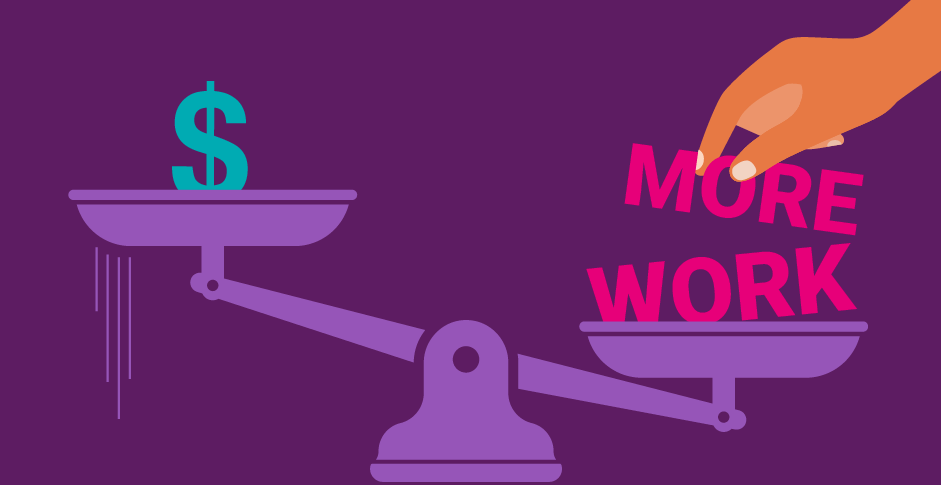More responsibilities but no compensation?
Have you ever been asked to take on more responsibilities with no promise of a pay rise?
If a recent SEEK social media poll is anything to go by, the answer is a strong yes. Almost 9 in 10 people said they have been asked to take on more responsibilities in their careers, without getting a pay rise.
While not being compensated for taking on more responsibilities can be disheartening, the good news is that your manager clearly thinks you are capable, and if you approach the situation in the right way, you can use the extra work to pave the way to a much brighter future.
Here we ask Nick Hindhaugh, founding managing director at Six Degrees Executive to share his best strategies for making the most of more responsibility, no pay rise scenario, should you find yourself in one.
- Strategy 1: Play the long game
Although being asked to take on a new title, new responsibilities, or deliver on larger scale projects without being adequately compensated can be frustrating, if you ‘play the long game’ you can use the additional responsibilities to progress your career, whether in the company you are currently at, or at the next company that will benefit from the additional skills you have gained.
“What’s important is your ability to deliver on expectations,” Hindhaugh says. “This sends a powerful message to your manager and other potential employers that you are capable and willing to ‘step up’ and this has the potential to far outweigh any short-term salary increases.”
Hindhaugh says it’s a good idea to document the added tasks you are taking on, so when the time comes for you to either apply for another job or ask for a promotion or pay rise, you are able to clearly articulate how these extra activities have had tangible benefits.
“Highlight your achievements and show how they have benefitted your company or your team. Try to put the results in real terms. For example, how have your additional responsibilities saved your company money or time? Can you put a dollar figure on this?
- Strategy 2: Ask for career development to be built into your role
If the pay packet isn’t increasing but the responsibilities are, this is a great time to request additional education to support your career development.
“Ask your employer to support you to undertake further studies, help you upskill or hone your skills in a new area,” says Hindhaugh.
It’s also a chance to seek out a mentor or ask your manager to support you to find one. “Often a more senior person can play a key role in helping you achieve both your personal and professional career aspirations.”
- Strategy 3: Consider other benefits
Although important, monetary compensation isn’t everything.
“If a pay rise is out of the question, there is no harm in asking for non-cash benefits that might assist you in managing the greater responsibilities you have been asked to take on, such as additional leave, flexible working hours or the ability to work from home,” he says.
“Every organisation will have different policies so do some research and find out what incentives might be available to you.”
- Strategy 4: Take the opportunity to promote your personal brand online
The fact that you are increasing your skills and experience gives you a great reason to self-promote, says Hindhaugh.
“You can enhance your personal brand by updating your ‘career highlights’ on your online career profile. Share and post interesting content about your achievements online. With recruiters and employers increasingly using online career platforms such as SEEK Profile to find potential talent, you might just get approached out of the blue about a great opportunity.”
- Strategy 5: Ask for a pay rise anyway … or at least set a time for a pay rise discussion in the future
If you have been asked to take on extra tasks but there has been no mention of a salary increase, there is no harm in asking if you can schedule a meeting with your manager to discuss a salary review.
“Always tell your manager in advance that you wish to talk about compensation for your extra job responsibilities. At the meeting, you can share your achievements and how your additional responsibilities have benefitted your company or team,” says Hindhaugh.
If a pay rise is out of the question for the time being, you can ask to set a clear timeframe for a salary review in future.
“Having the courage to ask to be compensated for the work you do, shows that you value yourself and your time, and there is no doubt that a positive attitude goes a long way towards helping you achieve your goals,” says Hindlaugh.
And what if your pay rise request is rejected? “Remember to see the increase in responsibilities as a clear indication that you are good at what you do, try to keep your chin up and your internal relationships strong. It will pay off in the long run,” says Hindhaugh.
